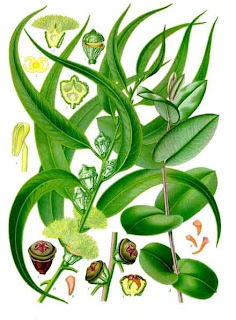 |
| Eucalyptus globulus |
According to a recent report of the Hong Kong Sanatorium & Hospital 40% of Hong Kong children currently suffer from different kinds of allergies; 10% alone are asthmatics. In fact, international data shows that the number of asthma sufferers is five times higher in urban areas than in rural ones. This is due to the absence of natural ozone absorption by plants. Exposure to ozone, even at low levels, induces airway inflammation and lung damage.
Read the following excerpt of the article “Aromatherapy and Asthma Management” from IFPA’s aromatherapy journal to learn how essential oils can help in the management of asthma:
How to reduce symptoms and improve lung function with aromatherapy?
Asthma is a chronic inflammatory disorder of the airways. It is associated with increased airway responsiveness to a variety of stimuli with recurrent symptoms and reversible airflow limitation. Stimuli such as inhalation of allergens or chemicals can cause acute bronchoconstriction (constriction of the airways in the lungs due to the tightening of surrounding smooth muscle, with consequent coughing, wheezing, and shortness of breath)
Traditionally, asthma is treated with medications that include anti-inflammatory corticosteroids (man-made drugs that closely resemble cortisol). While prescribed asthma medication should never be stopped without the approval of physicians, aromatherapy can have a steroid-sparing effect. Asthma management that includes aromatherapy can help reduce symptoms and improve lung function with fewer exacerbations. Massage, baths and – if indicated – inhalation should be considered to help prevent the occurrence of respiratory infections. Studies have shown that regular massage not only improved immune function with an increased function of the Natural Killer cells (NK cells), but also decreased anxiety with improved pulmonary function in asthmatic children.
Aromatherapy can also help in reducing exposure to a variety of triggers including allergens. Among them are house dust mites, animal allergens and fungi. Essential oils can be included in the washing of clothing, bedding and soft toys to control house dust and mite exposure. Essential oils found to be effective in killing mites include Eucalyptus, Citronella, Tea Tree and Spearmint.
 |
| APA's aromatherapy library |
Of course, when using essential oils with asthmatics an in-depth consultation must be made prior to treatment to avoid the risk of inducing airway limitation for asthmatics whose symptoms are triggered by fragrances.
To read the full article or learn more about asthma and aromatherapy, please visit our extensive library at APA. Diploma and Certificate students can borrow books and journals free of charge
No comments:
Post a Comment